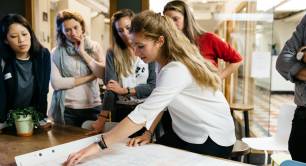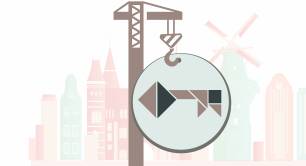How to build an impact city: Target transition
Local government initiative Amsterdam Impact is helping to reshape the business landscape in the Dutch city in six ways. Previously in this series, we explored how it is working to unlock market access for impact entrepreneurs. This time: how local authorities can team up with partners from all sectors, not only to nurture social entrepreneurship, but also to help accelerate the transition to a whole new economy.
Local government can play a key role in the transition to an economy that creates multiple forms of value. But it's not always clear how this can best be done. To lead by example, Amsterdam Impact aims to gather and share learning from programmes that catalyse the growth of social enterprises, and that embolden mainstream businesses to improve their social and environmental impact.
Profit-driven to purposeful pioneer
Among these is the newly-launched Building Better Business, a two-year collaboration with B Lab Benelux, which is part of B Lab Europe, the non-profit organisation behind the B Corp movement; and Economy for the Common Good, an economic model and global movement focused on a good life for everyone on a healthy planet.
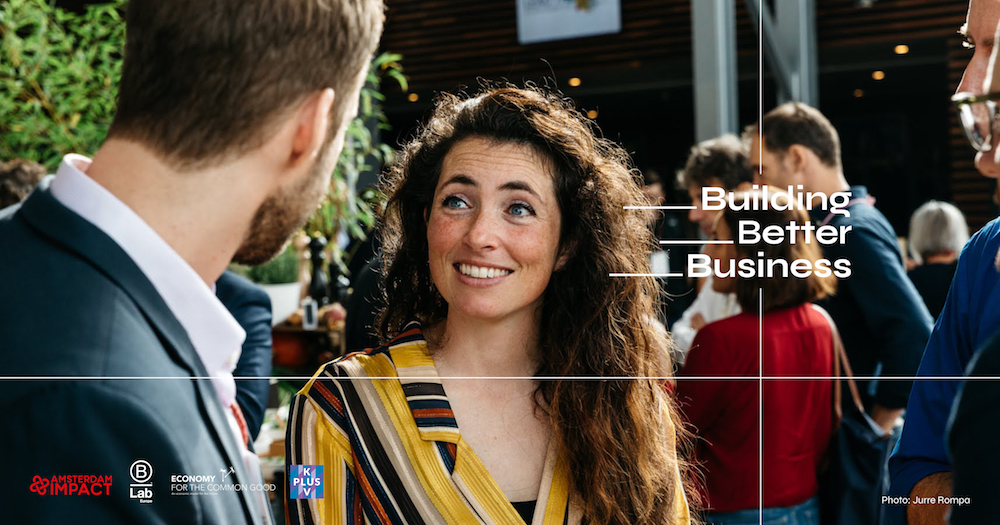 Building Better Business aims to provide participating companies with inspiration, guidance and support to transition from mainly profit-driven organisations into pioneers of creating change through business.
Building Better Business aims to provide participating companies with inspiration, guidance and support to transition from mainly profit-driven organisations into pioneers of creating change through business.
By completing either of the B Lab or Economy for the Common Good programme tracks, companies can get tools to measure and improve their impact on people and planet, and to pursue a certification that verifies their social and environmental performance.
We want to encourage participants to take steps, even if small... Every organisation can make a change within its own sphere of influence
“It is rare to combine these two certification models in one project,” says Ellen Oetelmans, Amsterdam Impact’s programme manager. “Although they use different methods, both programme tracks help companies join the transition to a new economy. As the saying goes, ‘all roads lead to Rome’.”
- Explore the full Cities of Impact collection
Through Building Better Business, which is currently focused on companies based in the Amsterdam metropolitan area, the programme partners also aim to create a space in which participants can connect to – and learn from – like-minded organisations.
“We want to stimulate knowledge sharing, show great examples of companies already doing the work, and encourage participants to take steps, even if small. Business can be done differently, that’s the programme’s key message. Every organisation can make a change within its own sphere of influence,” says Oetelmans.
- Building Better Business kicks off with a free, online event on 12 May 2021. Speakers include Alice Steenland (chief sustainability officer of Dassault Systèmes), Christian Felber (founder of Economy for the Common Good) and Morten Lund Petersen (director of sustainability and innovation at B Corp-certified Royal Auping).
Three years, 80 partners
Helping companies to find the right balance between purpose and profit is just one way to shift to an economy that creates both societal and financial value. Other types of organisation also play a role.
“We need all economic sectors and all layers of society to contribute to a different type of economy,” says Oetelmans
To strengthen the Dutch impact entrepreneurship ecosystem, 80 organisations – including the City of Amsterdam – have joined the City Deal Impact Entrepreneurship.
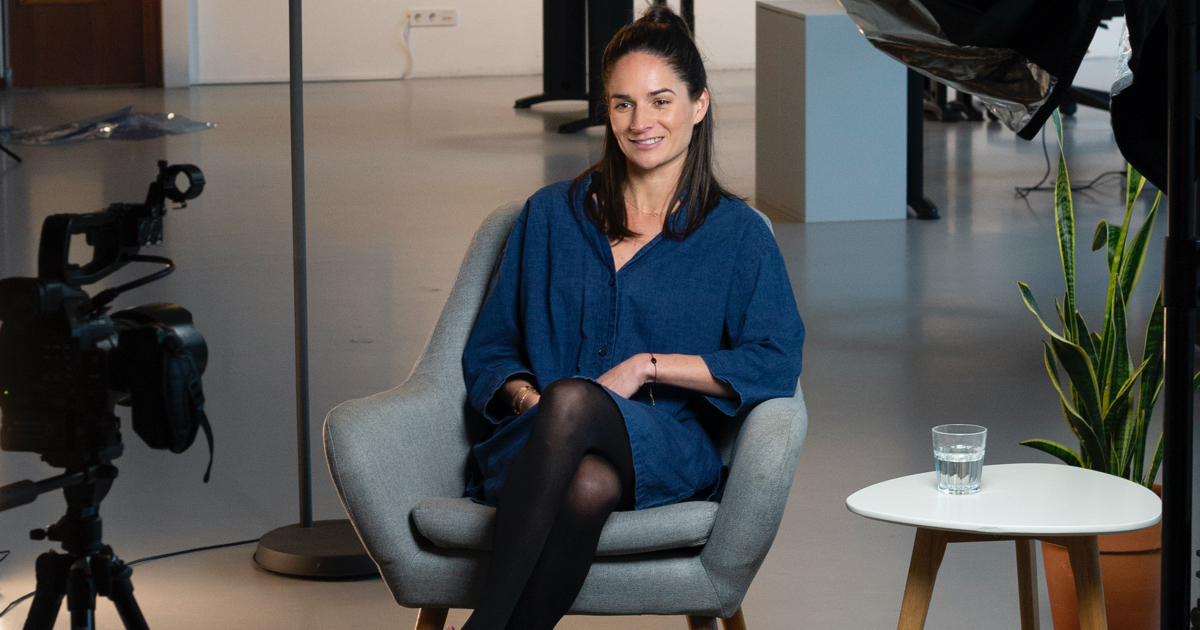
Above: Tess Lucassen of Growth Tribe – one of the speakers in the Impact Entrepreneurs masterclass series, which aims to support early-stage and growing impact enterprises
“The City Deal Impact Entrepreneurship is special because different levels of government, including national authorities, are collaborating with ecosystem partners on systemic change and concrete actions to remove the barriers faced by impact entrepreneurs,” Oetelmans explains.
Mona Keijzer, the Dutch Secretary of State for Economic Affairs and Climate Policy, launched the City Deal on 11 March 2021, during the Global Goals Meetup of VNG International, an association that designs and implements projects to strengthen local government.
The choices that municipalities, companies and individuals make can also have a major impact on the world - Mona Keijzer, Secretary of State for Economic Affairs and Climate Policy
“The choices that municipalities, companies and individuals make can also have a major impact on the world,” Keijzer said in her video message.
The three-year partnership is ambitious: it includes impact entrepreneurs, the national government, several Dutch provinces, mid-sized and large municipalities, educational institutions, network organisations, finance providers and consulting firms. “We have yet to see a similar deal in another country,” says Oetelmans.
Integral to the City Deal, she adds, is raising awareness of impact enterprises among impact-minded SMEs and larger companies. That can encourage partnerships that “yield innovative solutions” to big social challenges.
Startups for schoolchildren
Solving our most pressing challenges requires talented, entrepreneurial people – and Amsterdam Impact wants to help the future generation to develop the complex skills needed to make change happen.
“The current range of (impact) entrepreneurship courses for children and young people up to the age of 18 is rather limited,” says Oetelmans. To address this, Amsterdam Impact has launched a new project with Fawaka Entrepreneurship School and the Amsterdam University of Applied Sciences (AUAS).
Fawaka Entrepreneurship School is a social enterprise that offers programmes to empower children, regardless of their background or neighbourhood, to make a positive difference through entrepreneurship.
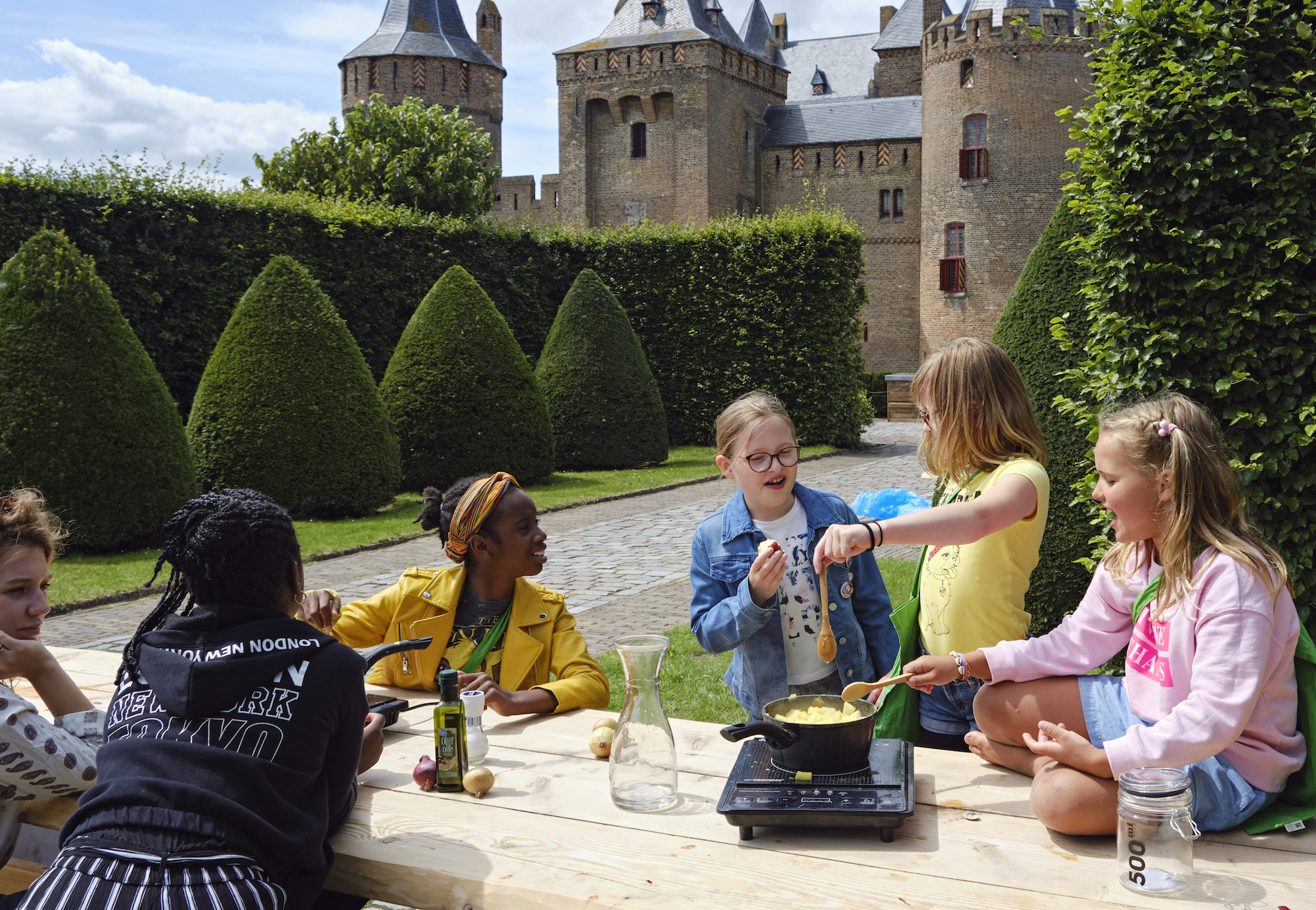
Above: Children at a summer school run by Fawaka Entrepreneurship School at Muider Castle in the Netherlands, part of a programme led by Amsterdam Impact, Fawaka and the Amsterdam University of Applied Sciences (credit: Fawaka Entrepreneurship School)
“How can we give younger generations the tools to build a more sustainable and inclusive society, to do things better than previous generations?”, says Thiëmo Heilbron, Fawaka’s founding director. “Our mission is to introduce all children in the Netherlands to sustainable entrepreneurship in a fun and friendly way.”
At As-Soeffah, the first primary school to have joined the project, Fawaka is helping the pupils to develop fictitious fair trade chocolate brands and products upcycled from discarded materials.
How can we give younger generations the tools to build a more sustainable and inclusive society, to do things better than previous generations?
“Our collaboration with Amsterdam Impact and the AUAS project is a major step forward. It will help us better to understand which knowledge and skills children are learning in our programmes, and to deliver more quality and positive impact,” says Heilbron.
Meanwhile, the AUAS is researching the effects of impact entrepreneurship education on career perspectives: when asked ‘what do you want to be when you grow up?’, would these children also say “impact entrepreneur” in addition to ‘pilot’ or ‘athlete’, for instance?
The results of that research aren’t yet clear, but Maarten Hogenstijn, senior social entrepreneurship researcher at AUAS, believes it’s “never too early” to start learning about impact entrepreneurship. Projects like those run by Fawaka teach pupils to “engage in society in an entrepreneurial way” from a young age, he says.
And for Amsterdam Impact, it’s a way to help children gain skills to solve societal challenges in a variety of professional roles.
“We hope to see an educational path that starts in kindergarten and promotes ecosystem thinking and collaboration, instead of competition,” Oetelmans explains.
Tools for resilience
Ecosystem thinking also guided Amsterdam Impact’s initiatives dedicated to supporting early-stage and growing impact enterprises, who are particularly vulnerable during the uncertainty caused by the Covid-19 pandemic.
With Impact Hub Amsterdam and the Goldschmeding Foundation, Amsterdam Impact launched the RE:SILIENCE programme to help impact enterprises emerge from the current crisis stronger than before. Thirteen companies from across the Netherlands joined the programme to reimagine their strategies with the guidance of experts and mentors.
- Meet Amsterdam's impact enterprises: The plant-based cheese producer putting planet first
One of the programme’s most valuable aspects was a safe space to exchange business experiences with peers.
“If you discuss the case of another entrepreneur, you automatically start to reflect on whether you should pay attention to the same area of your own business,” Laurens Nolet of Roetz Bikes – which are made from reused steel frames, by people facing barriers to employment – told Impact Hub last year.
|
The Impact Entrepreneurs: a series of free online masterclasses Amsterdam Impact has teamed up with Social Enterprise NL and Impact Hub Amsterdam to create an online series of masterclasses dedicated to supporting early-stage and growing impact enterprises, especially in these uncertain times. All six masterclasses are free to watch. Once registered and logged in, you can turn on English subtitles on the page of each masterclass:
|
Another lesson was that trends in business model innovation, such as the transition from linear to circular production, were being accelerated by the crisis.
“Our solution is something that all brands that work with textiles now need. We had foreseen that, but Covid-19 has accelerated demand,” said Barbara Putman Cramer of By Borre (pictured), which allows brands to custom engineer textiles and have them produced on demand with sustainable materials and techniques that reduce waste.
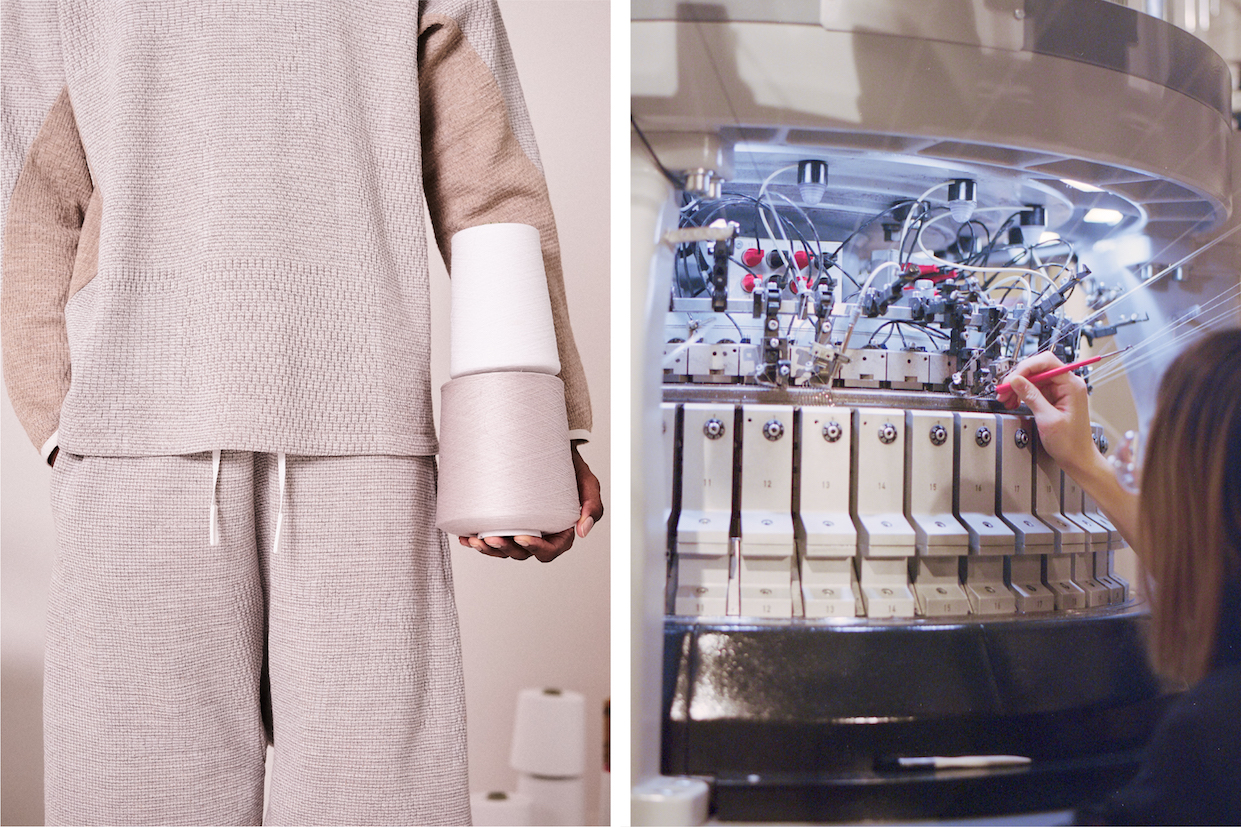 Thanks to the success of RE:SILIENCE’s national edition, Amsterdam Impact and Impact Hub Amsterdam continued their collaboration in an online-only programme for 13 additional entrepreneurs, from the Amsterdam metropolitan area.
Thanks to the success of RE:SILIENCE’s national edition, Amsterdam Impact and Impact Hub Amsterdam continued their collaboration in an online-only programme for 13 additional entrepreneurs, from the Amsterdam metropolitan area.
And to further support impact enterprises who seek inspiration, want to sharpen their business models or need tools to become future-proof, Amsterdam Impact teamed up with national membership body Social Enterprise NL and Impact Hub Amsterdam for a series of free online masterclasses.
Hosted by experts on topics ranging from commercial strategies to growth marketing and finding capital, the series was launched in December 2020.
“By creating a resilience-themed series of publicly available masterclasses, our ambition was to give as many impact entrepreneurs as possible the tools to launch or grow businesses that make a difference, especially now,” says Oetelmans.
With nearly 400 entrepreneurs now signed up to the masterclass platform, her plans are already well under way.
Image credits: Building Better Business by Jurre Rompa; By Borre by Studio Don Don
Coming soon: how capital, education and connections are crucial components of building an impact city; plus, we’ll meet some of the impact entrepreneurs demonstrating how it’s done. Check back soon for more or sign up to the Pioneers Post newsletter to stay updated.


